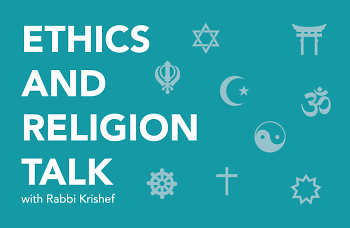Ethics and Religion Talk is seeking new members of the panel of clergy. We prefer individuals who serve congregations, but will consider those with administrative or academic positions. Applicants should have strong writing skills and be willing to respond to two to four questions a month. We are particularly interested in panelists representing places of worship in underrepresented communities, especially people of color. We prefer responses that draw on scriptural or other texts of their tradition. If you are interested, please contact Rabbi David Krishef at [email protected].
And now, our question of the week – Laura writes:
“Hello, I'm teaching a class on religious ethics, which of course focuses on ‘official’ doctrine and practices. My students wonder, in the experience of your columnists, how often they are consulted by congregants (or other adherents) about ethical dilemmas? Are Americans these days relying on their faith leaders more or less to help them with specific moral problems?”
Linda Knieriemen, Senior Pastor at First Presbyterian Church in Holland, responds:
“When I was a church pastor I was consulted relatively little about ethical dilemmas. I did, however preach relatively often about societal and ethical challenges for example, sermons about abortion, same-sex relationships, the environment and tattoos, to name a few, sit in my files!”
Fred Stella, the Pracharak (Outreach Minister) for the West Michigan Hindu Temple, responds:
“Yes, I am consulted on a pretty regular basis by adherents on a variety of issues. I will say that there are fewer conversations about ethics and more about spiritual practice. But occasionally there are queries on issues of morality and such. I get even more questions on that subject by non-Hindus when I am lecturing at a church or school. I think there is a natural curiosity to learn how close the religions come to consensus on moral issues. It is true that of all the elements that make up religions, we all seem to acknowledge similar values. What might be different are how we navigate the ethical challenges that come before us.
“As the last part of the question, yes, most likely Americans are relying less on faith leaders, as less people are affiliated with a religious community. I’m sure many turn to secular ethicists for advice, which is fine.”
The Reverend Colleen Squires, minister at All Souls Community Church of West Michigan, a Unitarian Universalist Congregation, responds:
“As a Unitarian Universalist minister, I am often asked ethical questions from my congregation and from residents of Grand Rapids. Some questions come by email asking for a meeting to discuss the issue in person. The most common ethical dilemma comes from parents of conservative faith traditions learning that their child is gay or trans. In their heart they wish to love their child unconditionally, but their faith says otherwise. I advise them to follow their hearts.”
Father Kevin Niehoff, O.P., a Dominican priest who serves as Judicial Vicar, Diocese of Grand Rapids, responds:
“Although I do not work and minister in a parish, I can attest that people often seek advice regarding ethical dilemmas. I can neither speak to Americans increasingly relying on faith leaders nor offer a quantitative assessment of this situation. Some always come for specific advice on ethical matters. These are people of all ages, ethnic groups, genders, etc.”
My response:
I’ve found that people in my community tend to frame their questions in terms of Jewish practice, rather than examine the ethics of decision-making. In informal conversations with other colleagues in the Jewish community, it seems to me that this is not unusual. Judaism is a religious of practice, rather than belief, so in general Jews are less concerned with their thought process and more concerned with their behavior.
In addition, for at least the past 30 years or more, North American culture has been drifting towards personal, rather than communal, sources of authority. Rather than asking a religious leader for help making decisions, people are more likely to turn to their own written sources of wisdom, Scriptural and otherwise. Pre-internet, a book called “The Jewish Catalog” launched a movement of do-it-yourself Judaism. Material that in a previous era was inaccessible to lay people or only available for people with highly developed Hebrew skills is, more and more, accessible and available in translation.
This doesn’t make clergy irrelevant any more than it makes doctors irrelevant in the era of WebMD or MayoClinic.com. Sometimes it raises the bar, forcing us to be more educated to be able to answer higher level questions. Sometimes it means that we spend time explaining why we disagree with a particular response found online and studying the process of getting to a decision with the questioner.
This column answers questions of Ethics and Religion by submitting them to a multi-faith panel of spiritual leaders in the Grand Rapids area. We’d love to hear about the ordinary ethical questions that come up in the course of your day as well as any questions of religion that you’ve wondered about. Tell us how you resolved an ethical dilemma and see how members of the Ethics and Religion Talk panel would have handled the same situation. Please send your questions to [email protected].
The Rapidian, a program of the 501(c)3 nonprofit Community Media Center, relies on the community’s support to help cover the cost of training reporters and publishing content.
We need your help.
If each of our readers and content creators who values this community platform help support its creation and maintenance, The Rapidian can continue to educate and facilitate a conversation around issues for years to come.
Please support The Rapidian and make a contribution today.
